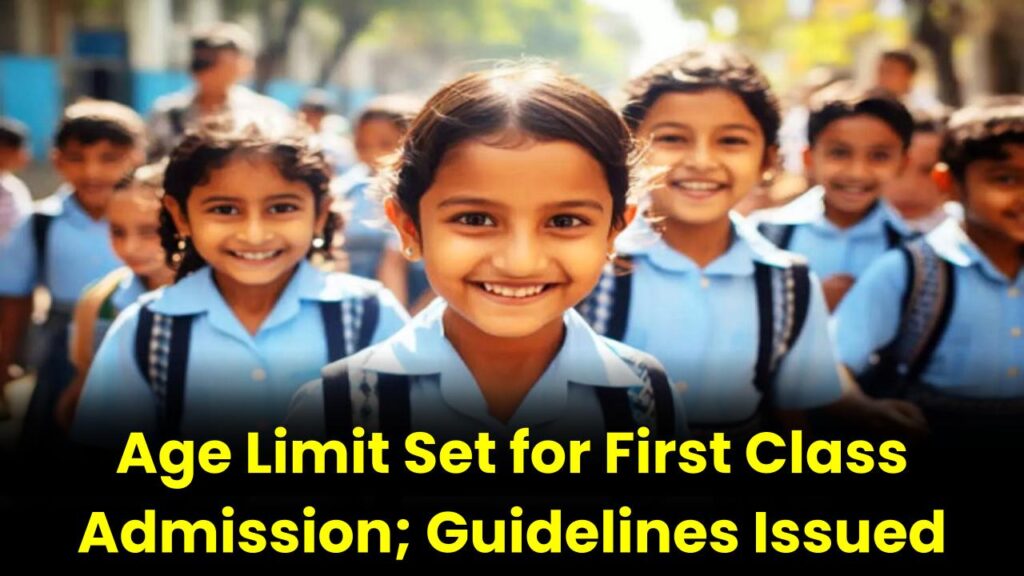
Age Limit for First Class Admission Fixed: Ensuring children start their education at the right age is crucial for their cognitive and emotional development. Recently, the government has fixed the age limit for first-class admission, setting a clear framework for both government and private schools. This article provides an in-depth look into the new guidelines, their implications, and how parents can navigate the admission process efficiently.
Age Limit for First Class Admission Fixed
| Topic | Details |
|---|---|
| Minimum Age for Class 1 Admission | 6 years as of April 1 of the academic year |
| Applicable Institutions | Government and Private Schools (CBSE, ICSE, and State Boards) |
| Policy Alignment | National Education Policy (NEP) 2020 |
| Reason for Age Fixation | To ensure developmental readiness for formal education |
| Alternative for Younger Kids | Enrollment in Pre-primary (Kindergarten, LKG, UKG) |
| Official Source | National Education Policy 2020 |
The new age limit for first-class admission is a crucial step toward structured early childhood education. By setting the minimum age at 6 years, the government ensures children are developmentally ready for formal schooling. This policy benefits both students and educators by fostering an age-appropriate learning environment. Parents should plan early and make informed decisions to support their child’s education journey.
Understanding the New Age Limit Rule
The National Education Policy (NEP) 2020 emphasizes the importance of early childhood education and has recommended that children entering Class 1 must be at least 6 years old by April 1 of the academic year. This rule is being uniformly applied across government and private schools.
Previously, many schools allowed children as young as 5 years to start Class 1. However, experts have pointed out that starting formal education too early can affect a child’s academic performance and emotional well-being. This new rule aligns India’s educational structure with global standards followed by countries like Finland, the United States, and Australia.
Why Was the Age Limit for Class 1 Admission Fixed?
The decision to set 6 years as the minimum age is based on extensive research on child development and learning outcomes. Here’s why this change is significant:
1. Ensuring Cognitive Readiness
Studies show that children develop essential language, motor, and social skills between ages 3-6. Starting school too early can overwhelm young minds, leading to stress and lower retention of concepts.
2. Aligning with the 5+3+3+4 Education System
The NEP 2020 introduced a new foundational learning framework:
- Foundational Stage (3-8 years): Pre-primary (3 years) + Class 1 & 2 (2 years)
- Preparatory Stage (8-11 years): Classes 3 to 5
- Middle Stage (11-14 years): Classes 6 to 8
- Secondary Stage (14-18 years): Classes 9 to 12
Under this system, a 6-year-old child is expected to be ready for the transition to formal education after 3 years of pre-primary learning.
UP RTE Admission 2025-26 Registration Link: Check Eligibility, Apply Process
Big Announcement on First Grade Admission Age – New Guidelines for Schools
RIMC Admission 2025-26 – Check Notification, Application Form, Eligibility, Entrance Exam Date
3. Standardizing School Admission Policies
Earlier, different states and boards had varying age criteria, leading to confusion for parents. With this policy, all schools—CBSE, ICSE, and state boards—follow a uniform rule, making the admission process more transparent and fair.
Implications for Parents and Schools
For Parents:
- If your child is under 6 years on April 1, they must continue in pre-primary education.
- Check with your state’s education board and school to confirm admission guidelines.
- Plan early—ensure preschool enrollment at age 3 to align with the foundational learning phase.
- Prepare your child through structured learning activities to help with a smooth transition.
For Schools:
- All educational institutions must adhere to the minimum age requirement.
- Schools need to guide parents about early childhood education options.
- Implementing age-appropriate curricula for preschoolers is essential to prepare them for Class 1.
- Training teachers to handle younger children effectively is necessary to maintain learning standards.
How to Check Your Child’s Eligibility for Class 1?
If you’re unsure whether your child meets the age criteria, follow these steps:
- Check Your Child’s Birth Certificate: Schools require an official birth certificate to verify age.
- Confirm the School’s Cutoff Date: While most schools follow April 1, some may have minor variations.
- Consult the School Administration: Ask if your child qualifies or needs to complete another year of pre-primary.
- Consider an Alternative Approach: If your child is younger than 6, explore playgroups, LKG, or UKG to enhance early learning.
- Engage in Early Childhood Development Activities: Activities like storytelling, puzzles, and group games can prepare children for Class 1.
FAQs On Age Limit for First Class Admission Fixed
1. What happens if my child is 5 years and 11 months old?
Most schools strictly follow the age criteria. If your child falls short, they may have to complete another year in pre-primary before moving to Class 1.
2. Does this rule apply to all states in India?
Yes, this guideline applies across India as per the NEP 2020, but some states may have specific variations. Check your state’s education board for details.
3. Will my child be at a disadvantage if they start later?
Not at all! Studies show that children who start school at the right age tend to perform better academically and socially.
4. Can I request an exception for my child?
In rare cases, some schools may consider exceptions, but this depends on state regulations and the school’s discretion.
5. How can I prepare my child for Class 1?
- Encourage Play-based Learning: Focus on storytelling, drawing, and social interaction.
- Develop Motor Skills: Activities like pencil gripping, cutting paper, and coloring help prepare for writing.
- Enhance Communication: Reading books and engaging in conversations improve language skills.
- Introduce Basic Concepts: Teach numbers, letters, and shapes in a fun and engaging way.







